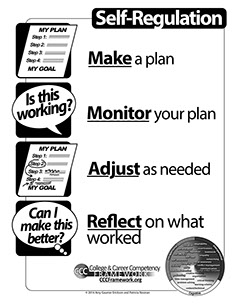Teaching Your Teen to Self-Regulate
We want our children to become independent, lifelong learners who can set goals for themselves and complete important tasks. When children struggle with meeting deadlines, reaching goals, and taking ownership of their learning, they lack self-regulation. Self-regulation is a proactive, self-directed process for attaining goals, learning skills, managing emotional reactions, and accomplishing tasks. We can teach teens specific skills to support their ability to self-regulate. This 6-minute video introduces the concept of self-regulation, clarifies the definition, and provides examples of self-regulation at home and at school.
Teens can apply self-regulation both in and out of school. As parents, we support self-regulation by talking to our teens about their goals and how they are going to progress toward them, helping them work through homework challenges, and talking with them about how to manage their emotional reactions.
Listen as Dr. Amy Gaumer Erickson, Associate Research Professor at the University of Kansas, discusses some of the impacts of self-regulation, breaks down the definition, and shares the components necessary to successfully self-regulate.
Our goal is to have our children direct their own success. Let’s explore the self-regulation process. In this video, you will hear from Izzy, a high school senior. She talks about how she created a plan to complete her online Physics homework.

Izzy’s plan included time management, organization of her assignments, and consideration of distractions that might derail her plan. Let’s take another look as Izzy explains the difference between monitoring progress and monitoring actions.
Izzy used a checklist to monitor her assignment completion. She also reflected on her choices for breaks and adjusted her plan to include exercise as a break instead of snacking as she noticed it helped her be more productive.
Izzy showed us one way to self-regulate homework completion. Dr. Gaumer Erickson shares another example of a checklist for self-regulating homework assignments.
As adults, we often encounter situations where things don’t go as planned. When teens encounter setbacks to their plan, they find it difficult to persist. Dr. Gaumer Erickson describes three strategies to help your child overcome obstacles: mental contrasting, analyzing options, and implementation intentions.
Next Steps
We want to support our children by coaching them rather than directing them. What questions would you ask your children to encourage them to proactively make detailed plans for success? What actions could they use to monitor their plans and determine if their plans are successful? Are your children able to anticipate what things might interrupt their plans? How could you make time to reflect with your teen?
To get started, choose something to help your teen practice self-regulation. Here are a few ideas:
• Time on electronics
• Responding calmly when feeling frustrated
• Independent reading
• Getting up for school on time
• Getting homework done
• Washing clothes for a sport or job
• Saving money to buy something
Remember that self-regulation is self-directed, so while you might ask questions and give advice, your child should create and work on the plan. Make time to ask about how the plan is going and whether adjustments have been needed. Help your teen reflect on what is going well and what isn’t throughout the process of self-regulation.


















